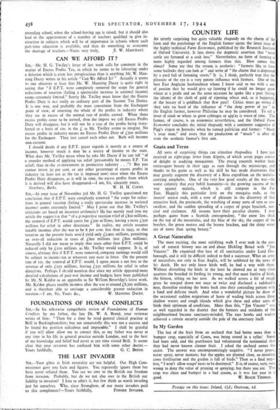Sot,—In your issue of November 3rd Mr. II G. Twilley
questioned my conclusion that if E.P.T. were completely removed " the scope for reduc- tions in general taxation (failing a really spectacular increase in national income) seems extremely limited." May I point out that Mr. Twilley's criticisms are based on incorrect arithmetic? He has merely read into my article the suggesicn that " of a prospective taxation relief of £800 millions, the removal of E.P.T. would count for £500 millions, leaving a mere £300 millions for relief in other directions." In reality, my article assumes taxable incomes after the war to be 8 per cent, less than in 1943, so that taxation on the present basis wou'd yield only £2,900 millions, permitting an over-all reduction in taxes of £600 millions (not £800 millions). Naturally I did not mean to imply that taxes other than E.P.T. could be reduced only by £m° millions. as Mr. Twilley would suppose. It is, of course, obvious that if E.P.T. were removed, company earnings would still be subject to income-tax at whatever rate were in force. On the present rate of los. the removal of E.P.T. would, I agree, mean a net loss to the revenue of only £250 millions, leaving £350 millions for relief in other directions. Perhaps I should mention that since my article appeared more detailed calculations of post-war income and budgets have been published by Mr. N. Kaldor as an appendix to Sir William Beveridge's latest work. Mr. Kaldor places taxable incomes after the war at around £8,500 millions, and is therefore able to envisage a considerably greater reduction in


























 Previous page
Previous page